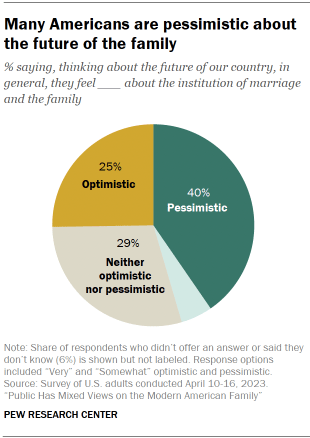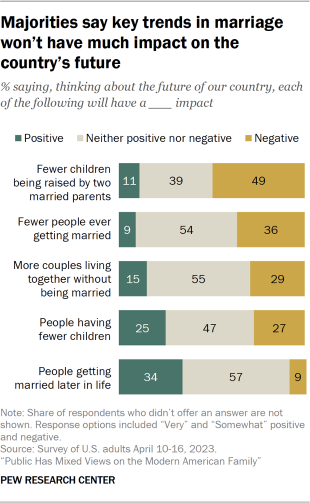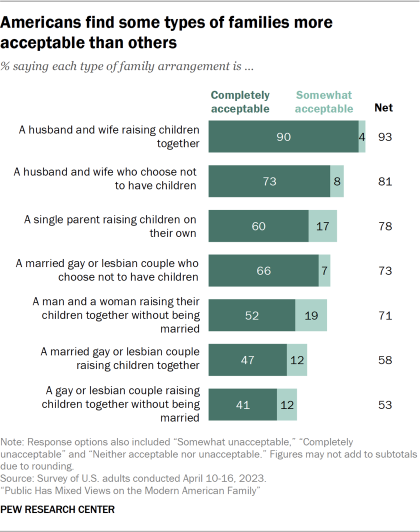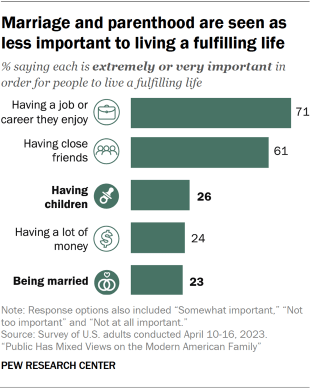More are pessimistic than optimistic about the future of the family; relatively few see marriage and parenthood as central to a fulfilling life

Pew Research Center conducted this study to better understand Americans’ views of trends in marriage, fertility and family life; the responsibility of family members to support each other; and factors that lead to a fulfilling life.
This analysis is based on a survey of 5,073 U.S. adults conducted April 10-16, 2023. Everyone who took part is a member of the Center’s American Trends Panel (ATP), an online survey panel that is recruited through national, random sampling of residential addresses. Address-based sampling ensures that nearly all U.S. adults have a chance of selection. The survey is weighted to be representative of the U.S. adult population by gender, race, ethnicity, partisan affiliation, education and other categories. Read more about the ATP’s methodology.
Read more about the questions used for this report and the report’s methodology.
References to White, Black and Asian adults include those who are not Hispanic and identify as only one race. Hispanics are of any race.
All references to party affiliation include those who lean toward that party. Republicans include those who identify as Republicans and independents who say they lean toward the Republican Party. Democrats include those who identify as Democrats and independents who say they lean toward the Democratic Party.
Trends in marriage and fertility along with shifting social norms and important legal changes have reshaped the American family.

Public views of the family are complicated. Americans are more pessimistic than optimistic about the institution of marriage and the family.
And there is no consensus on how some of the broad trends that are driving family change will impact the country in the future. Majorities say fewer people marrying these days and more couples living together without being married won’t have a positive or negative impact.
There’s baseline support for a variety of family arrangements, but the public still favors some types of families over others. Families that include a married husband and wife raising children are seen as the most acceptable. At the same time, relatively few Americans say marriage and parenthood are central to living a fulfilling life.
For this report, we surveyed Americans on:
- The future of the family
- Views of different family types
- Views of divorce and open marriages
- Family responsibility
- What makes for a fulfilling life
The survey included 5,073 U.S. adults and was conducted April 10-16, 2023, using the Center’s nationally representative American Trends Panel.1
Views of the future of family life

Overall, 40% of Americans say, in thinking about the future of the country, they are very or somewhat pessimistic about the institution of marriage and the family. Only 25% are very or somewhat optimistic, and 29% say they are neither optimistic nor pessimistic.
The survey asked about some key trends in family life and what impact they might have in the future. The one that was viewed most negatively by far was the trend toward fewer children being raised by two married parents. About half of adults (49%) say this will have a negative impact on the country, while 11% say the impact will be positive.
Nearly half or more say other trends – such as people having fewer children or marrying later in life – will have neither a positive nor negative impact.
Related:
- About 8 in 10 women in opposite-sex marriages say they took their husband’s last name
- A growing share of Americans say they’ve had fertility treatments or know someone who has
For more detail, including demographic data, on views of the future of family life, refer to Chapter 1 of this report.
Views of different family types

Many Americans are accepting of a range of different family arrangements. Most say an opposite-sex couple raising children, whether married or not, is an acceptable arrangement. And majorities say the same about single parents and about gay or lesbian couples with or without children.
There are differences in the degree of acceptance, however. Nine-in-ten adults say a husband and wife raising children together is completely acceptable. In contrast, 60% say a single parent raising children on their own is a completely acceptable arrangement. And fewer than half (47%) say the same about a married gay or lesbian couple raising children.
For more detail on views of family arrangements, refer to Chapter 2 of this report.
Factors that lead to a fulfilling life

Americans most often point to job satisfaction and close friends – rather than being married or having children – when asked what factors contribute to a fulfilling life. Some 71% say having a job or career they enjoy is extremely or very important for people to live a fulfilling life, and 61% say the same about having close friends.
Only about a quarter say having children (26%) or being married (23%) is equally important.
For more detail on these findings, refer to Chapter 5 of this report.
How attitudes about family life vary across different groups
Views of a range of issues related to the modern family vary widely by:
- Age: Across age groups, younger adults (ages 18 to 29) are less pessimistic about the future of marriage and the family. They’re also more accepting of family arrangements involving gay and lesbian couples. Older adults (ages 65 and older) are the most likely to say being married is extremely or very important in living a fulfilling life.
- Race and ethnicity: White adults are more pessimistic than Black and Hispanic adults about the future of marriage and the family, but also more accepting of a variety of family types. When it comes to families that include gay or lesbian couples, White and Asian adults tend to be more accepting than Black or Hispanic adults.
- Partisanship: Party divides on these questions are deep and consistent. Republicans and those who lean to the Republican Party express more pessimism than Democrats and Democratic leaners about the future of marriage and the family, and are more likely to view broad trends that are shaping family life as negative. Republicans are also less accepting than Democrats of any family arrangement that doesn’t involve a married husband and wife raising children together. The partisan gaps are particularly large when it comes to family arrangements that involve gay or lesbian couples with children.
Additional key findings from the survey:
- The public has mixed views of the impact falling fertility rates are having on society. On balance, Americans are more likely to say people having fewer children has a positive rather than negative impact on women’s careers and job opportunities and on the environment. But more say this trend has a negative rather than positive impact on the future of the Social Security system and the economy more broadly. To learn more, refer to Chapter 1, “The future of the family.”
- Americans are skeptical about open marriages. Half of adults say marriages where both spouses agree that they can date or have sex with other people are unacceptable. A third say these marriages are acceptable. Young adults are more open to this type of arrangement than older age groups: 51% of 18- to 29-year-olds say open marriages are acceptable. To learn more, refer to Chapter 3, “Views of divorce and open marriages.”
- When it comes to divorce, more say unhappy couples tend to stay in bad marriages too long (55%) than say they get divorced too quickly (43%). Men are more likely than women to say unhappy couples split up too quickly. Adults younger than 30 are among the most likely to say these couples stay together too long.
- People’s experiences in their own family weigh more heavily than other factors in shaping their view of what makes a good family today: 68% of adults say what they experienced growing up in their family had a great deal or a fair amount of influence on their views of what makes a good family arrangement. Smaller but still substantial shares point to their religious views and what they’ve seen from their friends or their friends’ families. To learn more, refer to Chapter 2, “Views of different family types.”
- Majorities say adult children have a great deal or a fair amount of responsibility to provide caregiving (66%) and financial assistance (55%) to an elderly parent who needs this type of support. Much smaller shares say parents have at least a fair amount of responsibility to provide financial assistance to their adult children (31%) or to save money to hand down to their children after they die (32%). To learn more, refer to Chapter 4, “Family responsibility.”
CORRECTION (Nov. 2, 2023): A previous version of the pie chart “Many Americans are pessimistic about the future of the family” listed the “optimistic” share incorrectly. The actual share is 25%.




